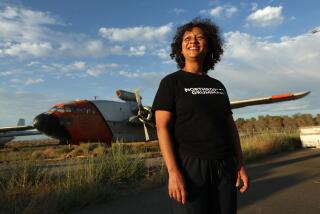Kensington University Faces Closure Hearing
- Share via
Kensington University has no classrooms, laboratories or dorms. Its students don’t play football, join fraternities or linger dreamily on a quadrangle. In fact, the entire campus is housed in a small Glendale office building.
Recruiting from across the nation, the school runs a program in which students studying entirely at home can earn anything from a bachelor’s degree to a doctorate--all without ever attending a single class or even meeting their instructors face to face.
To the school’s owner, Alfred Calabro, Kensington’s “no fat, no bull” correspondence method reflects the future of higher education: serving students who want to expand their knowledge but can’t afford to put their careers and bills on hold.
But to state regulators, Kensington hands out advanced degrees “which may have little, if any academic value” and has been perpetrating a “fraud on the public.”
For two years, the state has been trying to shut down the feisty 20-year-old institution, which has managed to stave off a closure order at least until a court hearing Thursday.
Kensington’s battle is a direct outgrowth of the state’s lively potpourri of ideas, politics and approaches to education, underscoring the best and worst aspects of that freedom.
Embracing the unconventional, California by the 1970s had become a hotbed of small private colleges offering easy degrees, with more such institutions than any other state, according to the California Postsecondary Education Commission, an advisory panel.
But during the 1980s, California gained a reputation as “the diploma mill capital of the world,” as one state study put it. So in 1989, the Legislature passed tougher regulations and later created the Council for Private Postsecondary and Vocational Education to enforce them.
Kensington fell under the council’s oversight as part of a little-known second tier of about 250 private, degree-granting schools with about 100,000 students statewide. Most are small, and many are operated for profit like Kensington.
But none have accreditation from a private oversight group called the Western Assn. of Schools and Colleges, an educational seal of approval. So under California law, Kensington and the others must undergo periodic reviews and obtain council approval to operate.
That’s where Kensington ran into trouble.
The school’s first state review in 1994 found many problems, including routine acceptance of below-par student work, awarding inflated credit for so-called “life experience,” and not having enough faculty.
In one case, reviewers found that the school awarded a doctoral candidate in psychology credit for reading magazine articles and doing about a dozen short reaction papers. A later report said the school also awarded doctoral degrees after as little as four months’ work.
In other violations cited by the state, an environmental science student received 52 credits for unspecified life experience, even though the legal limit is 30 credits. The same three instructors were reviewing all doctoral dissertations, regardless of the subject, even though the usual academic practice is for the readers to be experts in the field. And one education program graduate’s master’s thesis was replete with factual errors, regulators found.
“When you have to read through this stuff, you say, ‘Oh my God, Oh my God, Oh my God,’ ” said Elena Ackel, a Los Angeles legal aid attorney who is vice chair of the Council for Private Postsecondary and Vocational Education.
Several Kensington graduates said they were satisfied with the practicality of their instruction.
Cal State L.A. electrical engineering professor Martin Roden conceded that today his unaccredited doctorate would probably preclude him from his current post. He obtained the degree more than a decade ago, long after his 1968 appointment.
“They’re not a fraud, but certainly no one going there would be compared to someone with a UCLA degree,” he said.
Billy Rutherford, a Fullerton legal assistant who graduated from Kensington’s law program in 1993, said: “I was thankful they were there so I could pursue my educational goal and feed myself at the same time.”
Kensington President Clive Grafton said he has worked to resolve the problems cited by the state review by eliminating the school’s weak environmental science and psychological counseling programs, and increasing the faculty from about 30 to 45.
Although Kensington is one of many state-regulated schools to face closure orders--or to have left California--state officials said their fight with the school has become one of the longest and most hotly contested. In part, officials say, this is due to the fact that Calabro is an attorney.
Calabro, who worked his way through Southwestern University School of Law, founded Kensington in 1976 out of a sense that traditional university programs did not meet the needs of working adults. Their daytime classes conflicted with work, he figured; urban campuses did not serve people in remote areas.
So Calabro conceived Kensington’s “accelerated” approach for working adults. Or as he once said in an interview, “A guy who is selling polyurethane parts doesn’t have to take a foreign language to graduate.”
To its current 650 enrollees, Kensington offers no classes in foreign languages, music, the arts or other academic froufrou--just the basics of business, law, education and psychology, among other disciplines that lead more directly to jobs. Tuition ranges from $2,900 to nearly $4,500 for entire degree programs. The school claims more than 7,000 graduates.
The school took in about $1.2 million in tuition and reported a $25,000 profit for the 12-month period ending in early 1994, according to its most recent financial disclosure report to the state. Most of the faculty members work part time and hold other jobs, grading their students’ work at home.
“Admittedly Kensington is not the ideal,” said Garnet Birch, an education consultant and former college administrator who works as a Kensington instructor.
“But it really does meet a need for students who are trying not to beat the system, but to fulfill their professional and personal goals in a manner the traditional systems do not provide,” said Birch, who regularly talks to his students by telephone from his home in Temecula.
The spread of cable television-based instruction, two-way video conferencing and the Internet has made classroom attendance less crucial. The dividing line separating schools such as Kensington from Cal State branches, for example, has become blurred. However, other nontraditional and high-tech programs around the country do provide that human contact that Kensington lacks.
Penn State University and the University of Iowa have begun a joint program in which students can obtain undergraduate degrees through independent study at home. Thomas Edison State College, in New Jersey, is a leader in so-called distance learning. All three schools, however, maintain some level of student-faculty interaction.
More to Read
Sign up for Essential California
The most important California stories and recommendations in your inbox every morning.
You may occasionally receive promotional content from the Los Angeles Times.













